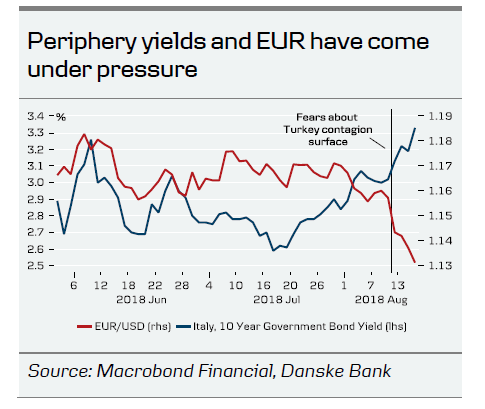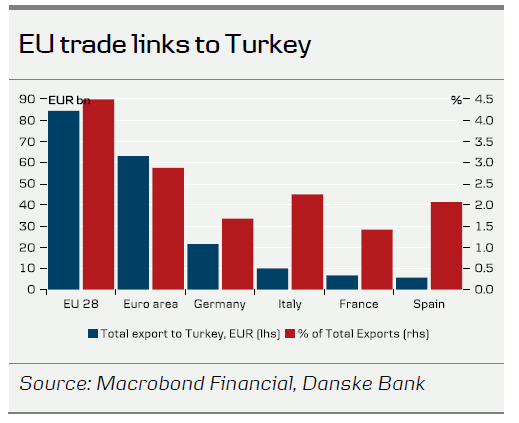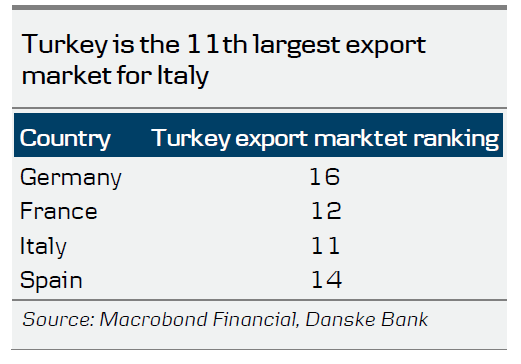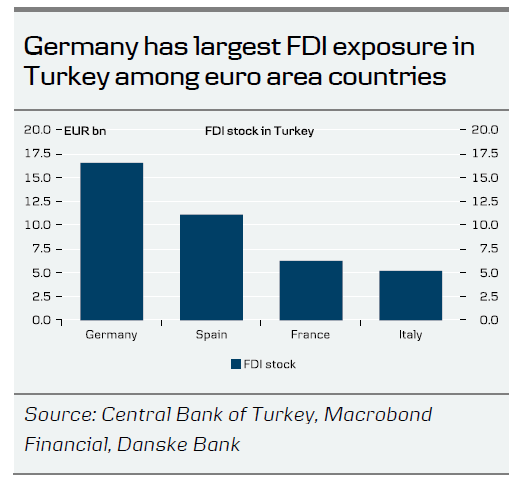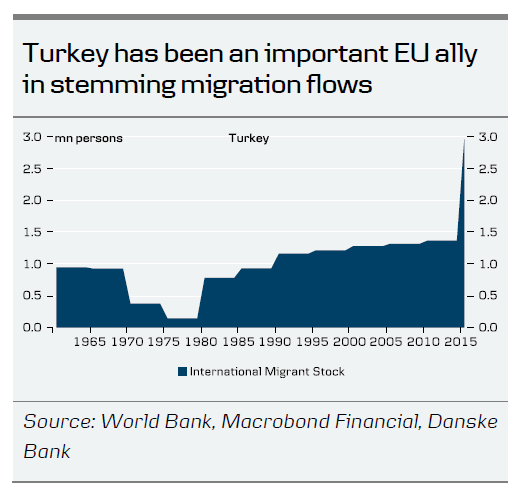- In light of the Turkish turmoil, we take a closer look at EU-Turkey ties in this document, focusing especially on the financial, economic and political links.
- EU banks’ exposure to Turkish assets is limited and we would be surprised to see the ECB reacting to the Turkey crisis with any policy measures.
- Trade and FDI links are of a relatively modest scale, limiting the possible risks to the euro area growth outlook from this channel.
- If the crisis escalates further, the EU might find itself pressured to consider support measures for Turkey, as the country has become an important puzzle in the European migration strategy.
Financial links: limited spillover
Both the euro and periphery bond yields have recently come under increased pressure among growing fears about contagion from the Turkish turmoil to the European financial system more broadly. Reports that regulators at the Single Supervisory Mechanism of the ECB have growing concerns about some EU banks’ exposure to Turkey further fuelled the risk-off mood.
From an EU perspective, Spanish and French banks stand out as particularly exposed to Turkish assets, especially in the non-bank private sector. However, putting the absolute numbers into perspective, as a share of total banking sector assets the exposures are small (around 2.0% of total banking sector assets for Spain and less than 0.5% for France, Italy and Germany).
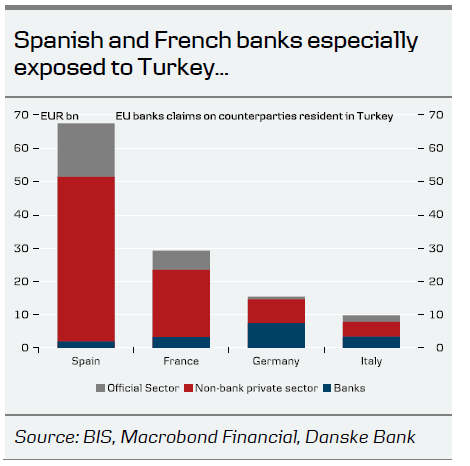
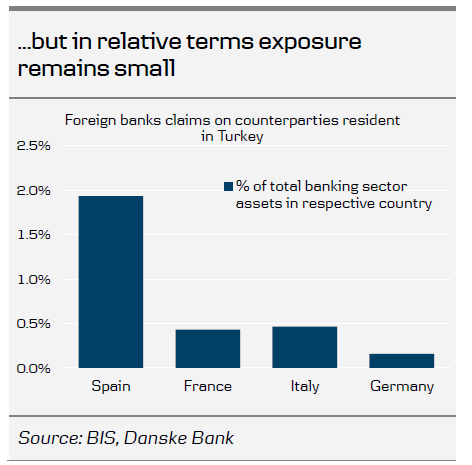 In light of the figures above we view fears of contagion to the Italian/Spanish banking system as overblown. Indeed, for European banks, developments regarding the new Italian government’s budget and deficit plans in September will be of much greater importance in our view. Despite encouraging comments from lawmakers regarding commitment to EU budget rules, we think it is too early to declare the Italian crisis over just yet
In light of the figures above we view fears of contagion to the Italian/Spanish banking system as overblown. Indeed, for European banks, developments regarding the new Italian government’s budget and deficit plans in September will be of much greater importance in our view. Despite encouraging comments from lawmakers regarding commitment to EU budget rules, we think it is too early to declare the Italian crisis over just yet
Economic links: German interests at stake
In terms of trade links, Germany exhibits the closest links in absolute terms with annual exports of EUR21.5bn in 2017. Turkey is the 16th largest export market for Germany, hence ranking higher than Japan. This said, exports to Turkey still accounted for only 1.7% of total German exports in 2017 and overall this limited exposure in relative terms also holds true for the other big euro area economies (Italy 2.2% of total exports, Spain 2.1% of total exports and France 1.4% of total exports went to Turkey).
From a foreign direct investment (FDI) perspective, Germany again dominates the picture, with an FDI stock if EUR16.5bn in 2017, followed by Italy with EUR11.1bn. About 6,500 partly or wholly owned German companies operate in Turkey, which means the German business community is likely to be watching the current situation with concern.
Political links: Turkey as important ally in the migration crisis
German politicians, including Chancellor Angela Merkel, have made it clear that Germany has an interest in an economically prosperous Turkey but, at the same time, have stressed the importance of central bank independence. German and Turkish finance ministers will meet in coming weeks ahead of a state visit of ğ on 28 September.
Despite the economic ties and Germany’s interest in avoiding Turkey’s financial meltdown, we would be surprised to see Germany, either directly or through the EU, providing significant financial support for Turkey, similar to Qatar, in light of the current German public mood towards bailouts and recent diplomatic clashes about human rights abuses and imprisonment of German citizens in Turkey. Instead, Germany’s Finance Minister Olaf Scholz is likely to stress to his counterpart that any kind of support measures would necessitate a return to a credible and independent monetary policy regime.
Although we view the hurdle to any kind of EU financial support measures as high, the EU might feel pressure to act not only out of economic and financial considerations but, more importantly, because Turkey has become a key piece of the puzzle in European migration strategy. A destabilisation of Turkey could put the future of the 2016 EU-Turkey deal on the relocation of Syrian asylum seekers at stake – in 2015 (the latest information available) about 3 million refugees were stuck in Turkey. A potential influx of a large number of immigrants from Turkey would provide further ammunition for populists across the block, with European Parliament elections approaching in May 2019.
Limited risks to EU growth but political picture remains muddy
Overall, we see the risk of a contagious crisis for the European financial system as fairly small at the current stage. We would be surprised to see the ECB reacting to the Turkey crisis with any policy measures and instead expect it to refer to the macro-prudential toolkit of the Single Supervisory Mechanism (SSM). From an economic perspective, Germany has the strongest interest in a resolution of Turkey’s troubles but total euro area trade and FDI links are of relatively modest scale, limiting possible risks to the euro area growth outlook from this channel. The diplomatic situation between the EU and Turkey remains fraught and we think it is questionable whether the EU would risk a further deterioration of its relationship with the US by openly siding with Turkey in the current conflict. However, a potential collapse of the refugee deal with Turkey is the main bargaining chip for Turkey in seeking EU support

